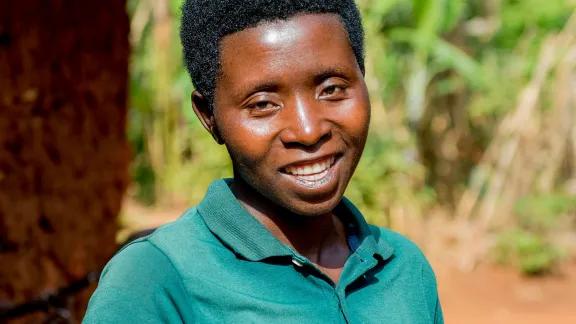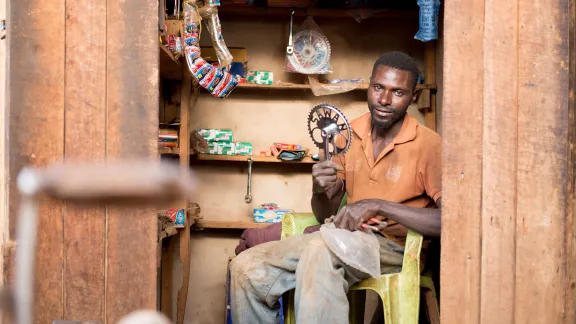
Euphigenie Ntezimana in front of her home. Photo: LWF/L. Gillabert
LWF project combines emergency response and development work
(LWI) – From 2021 to 2024, the Amahoro project of the Lutheran World Federation has been a lifeline for over 6,900 people in Burundi's Cankuzo and Ruyigi regions. This ambitious initiative has tackled hunger and changed lives, promoted gender equality, and reinforced community bonds in Burundi's Cankuzo and Ruyigi provinces.
Both provinces are in Eastern Burundi, where the main economy is agriculture. Many people are subsistence farmers who plant maize, coffee, sweet potatoes, and cassava. Infrastructure and access to basic services such as health, roads, and education are limited. The region has experienced civil war, large refugee movements, and struggles with high levels of poverty, made worse by the COVID-19 pandemic.
Food vouchers and cash for work
The war heavily affected many people in the East of Burundi, like Euphigenie Ntezimana. She fled to Tanzania when the situation became insecure in her village and she lost several family members due to violent conflicts. When she returned to Burundi in 2021, her home was destroyed. LWF helped her rebuild her house, but there was no work to earn a living.

Onesphore Manirakiza received the means to open his own repair shop . Photo: LWF/L. Gillabert
I was very interested in the lessons on raising children in an environment where boys and girls have equal rights, particularly when it comes to education
Euphigenie NTEZIMANA, project participant
She initially received food vouchers from LWF like other project participants. To help her and other community members become self-reliant, LWF created cash for work projects, paying the local community for constructing or rehabilitating community structures to ensure they had enough to eat and get back on their feet financially.
Ntezimana was enrolled in one of LWF's Farmer Field Schools, where she learned about new farming techniques, and Village Savings and Loan Associations (VSLAs), allowing families to pool resources and access loans. She also received various crops from the organization and instructions on plotting her land. Community micro-projects further rejuvenated local infrastructure and fostered social unity.
Resilient communities
"The impact of these initiatives has been profound," says Emmanuel Ndamurokore, LWF project manager. Many participants reported a significant increase in their income and that their financial situation had improved.
"Today, I am very proud of my happy and healthy children. They no longer go to sleep hungry," says Ntezimana. She also learned about child raising in her classes. "I was very interested in the lessons on raising children in an environment where boys and girls have equal rights, particularly regarding education," she says.
The Amahoro project has enhanced economic stability and food security and fostered a stronger, more engaged community. Project manager Ndamurokore claims that people are now more actively engaged in decision-making processes. "The project participants feel confident to voice their thoughts and opinions in public settings."


